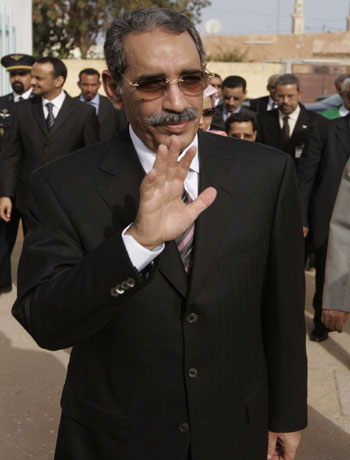
Mauritania Junta leader Col. Ely Ould Mohamed Vall seen before he places his referendum vote in the city of Nouakchott, Mauritania (AP)
NOUAKCHOTT, Mauritania, AP -Mauritania’s nearly year-old military junta gave voters a rare chance Sunday to limit presidential terms in their newly oil-rich nation, which has never seen power change hands without a coup.
The constitutional referendum, expected to pass overwhelmingly, marks a crucial first step toward a return to civilian rule ahead of presidential elections next year in this Arab-dominated Islamic republic in northwest Africa.
“The presidency does not belong to one person alone,” said bank worker Metou Mint Mohamed, who voted for the changes. “Nobody has the right to stay in office for life.”
The constitutional amendments would limit future presidents to two five-year terms. The cap on power is rare in the Arab world and Africa, where countries such as Gabon, Chad and Uganda recently have changed their constitutions to ensure long-serving heads of state can stay in office.
Junta leader Col. Ely Ould Mohamed Vall came to power after an Aug. 3 military coup that was welcomed by most here because it ended the repressive 21-year rule of ex-President Maaoya Sid’Ahmed Ould Taya, who lives in exile in the Persian Gulf state of Qatar.
Vall has won praise at home and abroad for reaching out to a broad spectrum of political parties, and guiding his impoverished nation of less than 3 million people toward its first real democratic elections since independence from France in 1960.
Foreign governments have quietly warmed to Vall’s regime, lauding its moves to ensure transparency in governance and the newly established oil sector, which began pumping crude in February.
Daily production is about 41,000 barrels — small compared to Africa’s oil giants but significant in a country where many get by on less than $2 per day. Oil officials expect production to rise to 300,000 barrels a day by 2009.
The referendum is the junta’s first ballot since seizing power. It is a prelude to municipal and legislative polls due in November and a presidential election slated for March — five months earlier than the junta promised after taking power last year in the nation three times the size of New Mexico on the edge of the Sahara desert.
“This is the birth of a new Mauritania,” a black business-suited Vall said after casting his ballot in the sand-swept capital amid a throng of reporters. “This is the first time our people have had the chance to choose freely and determine their own destiny.”
Vall, who served as national police chief for two decades, has said no member of his junta would stand in upcoming elections. He reiterated that vow Sunday and said he would step down.
If the referendum passes, a new head of state would have to swear on the Quran not to alter the limits on his time in office.
After polls closed, vote counting began immediately in some stations in the capital by the light of fluorescent lanterns. Preliminary results are expected Monday.
The new constitutional amendments also would shorten terms in office, which had been six years.
Mauritania has weathered more than 10 coups or attempted coups over the last half-century. Last week, authorities detained five reported Taya associates, including an active-duty army colonel, for allegedly plotting to sabotage the referendum and destabilize the country.
Armored personnel carriers patrolled Nouakchott during previous elections. They were absent Sunday from the streets of the capital, where dust-caked Mercedes-Benzes cruise empty roads, and the blue-and-white flowing robes of men and flowery bright dresses of women add the only color to an almost treeless landscape of two-story sand-colored buildings.
Outside one polling station, soldiers leaned their guns against a wall as they sipped tea in the shade. At another, soldiers and poll workers took a break in the midday heat for a communal lunch of camel meat on a round tray.
Dozens of international observers from the African Union, the Arab League and other groups were on hand to monitor the poll — welcomed into the country as part of the junta’s efforts to prove its openness.
About one-third of the country’s 2.8 million people registered to vote in the referendum.
A handful of small parties oppose the vote on the grounds that it fails to tackle once-taboo issues like slavery, which they want barred by the constitution, and the rights of black African minorities in an Arab-dominated nation.

Woman stand in a queue as they wait to vote in the country-wide referendum in the city of Nouakchott, Mauritania (AP)

Two women at a voting station in the city of Nouakchott, Mauritania (AP)
